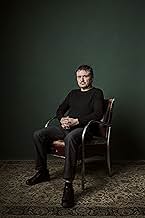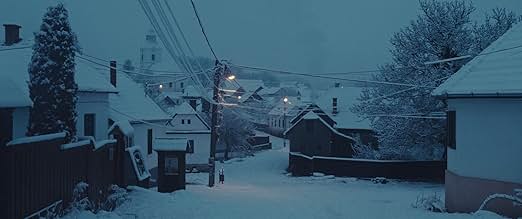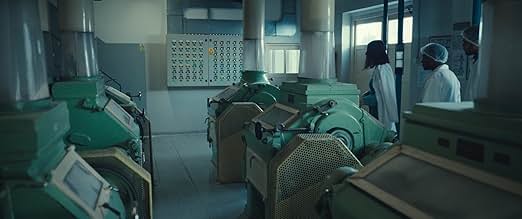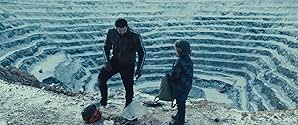PUNTUACIÓN EN IMDb
7,2/10
6,3 mil
TU PUNTUACIÓN
Un análisis sin prejuicios sobre las fuerzas motrices del comportamiento humano ante lo desconocido, sobre la forma en que percibimos al otro y sobre cómo nos relacionamos con un futuro inqu... Leer todoUn análisis sin prejuicios sobre las fuerzas motrices del comportamiento humano ante lo desconocido, sobre la forma en que percibimos al otro y sobre cómo nos relacionamos con un futuro inquietante.Un análisis sin prejuicios sobre las fuerzas motrices del comportamiento humano ante lo desconocido, sobre la forma en que percibimos al otro y sobre cómo nos relacionamos con un futuro inquietante.
- Dirección
- Guión
- Reparto principal
- Premios
- 7 premios y 18 nominaciones en total
Endre Rácz
- Tibi
- (as Rácz Endre)
Reseñas destacadas
Cristian Mungiu is one of the "founding fathers" of the Romenian new wave that started around 2005 with movies such as "The death of Mr Lazarescu" (2005, Cristi Puiu), "12:08 East of Bucharest" (2006, Corneliu Porumboiu) and of course the breakthrough movie of Mungiu himself "4 month, 3 weeks and 2 days" (2007). More than 15 years later the Romenian new wave is still alive and kicking. In 2022 the experienced director Mungiu delivers an excellent movie with "R. M. N" but there is also the "new name" Alexandru Belc with "Metronom". New name is maybe a bit exaggerated because Belc already contributed to the script of "4 month, 3 weeks and 2 days".
"Metronom" is situated in 1972 during the Ceausescu years and is thus typical Romenian. "R. M. N" covers more general themes. It is about Matthias (Marin Grigore) and his home village. After working in Germany for a while Matthias returns to his home village. In this village three Sri Lankan workers arrive at the local bakery because vacancies are difficult to fill (many workers work in the West). The arrival of the Sri Lankan workers leads to a lot of tension in the local community.
The above description seems to indicate that "R. M. N" is above all about racism, and that is not entirely untrue. In a key scene with a duration of twenty minutes there is a meeting in the village hall. In this meeting all prejudices against the Sri Lankan (and foreigners in general) are given free reign.
In my opinion "R. M. N" is about racism but not only about racism. It is also about hypocrisy. I give a number of examples.
In the first place Romanians working in Germany is no problem, but a Sri Lankan working in Romania is.
The film is situated in Transsylvania, a region with a Hungarian minority. This minority wants not to be discriminated against, but on the other hand has no problem discriminating other people.
There are also people defending the Sri Lankan workers, but this are their employers that have an economic interest. Their defence that no Romenian reacted on the vacant positions meets with the reply that they were only willing to pay minimum wages. So their bevaviour has at least a hint of hypocrisy to it. They are certainly not the good guys against the evil and dumb majority. In the films of Mungiu there seldom is a simplistic good versus bad distinction. In this respect the portrayel of one of the empoyers (Csilla Szabo played by Judith State) as always drinking a glass of red wine and always playing the cello was already a bit too "bourgeois" to my liking.
The village of the movie is situated on the edge of a primaeval forest. This is no coincidence as the forest symbolizes mystical and animal spirits, with recurring references to brown bears. These animal spirits overtake rational thought when it comes to reacting to foreigners. This is illustrated in the meeting in the village hall (in the scene already mentioned to) when some villagers tried to wrap their prejudices in rational arguments (maybe the foreigners carry unknown viuses with them). When their argument is refuted (we let them work with protecting rubber handshoes) the prejudice inside shows itself (but we simply don't want them here).
"R. M. N" is an ominous film with mob violence constantly in the air. In this respect it resembles "Werckmeister Harmoniak" (2000, Bela Tarr), although the last mentioned film is more abstact. The resemblance was for me the most obvious in the new years day parade with people in bear costumes fighting a neighbouring village as part of a new year tradition. For me this scene was the most Tarr like combining in an abstract manner animal spirits with xenophobia. The twenty minutes scene in the village hall did the same thing, but in a much more concrete way. This scene is more characteristic of Cristian Mungiu himself.
"Metronom" is situated in 1972 during the Ceausescu years and is thus typical Romenian. "R. M. N" covers more general themes. It is about Matthias (Marin Grigore) and his home village. After working in Germany for a while Matthias returns to his home village. In this village three Sri Lankan workers arrive at the local bakery because vacancies are difficult to fill (many workers work in the West). The arrival of the Sri Lankan workers leads to a lot of tension in the local community.
The above description seems to indicate that "R. M. N" is above all about racism, and that is not entirely untrue. In a key scene with a duration of twenty minutes there is a meeting in the village hall. In this meeting all prejudices against the Sri Lankan (and foreigners in general) are given free reign.
In my opinion "R. M. N" is about racism but not only about racism. It is also about hypocrisy. I give a number of examples.
In the first place Romanians working in Germany is no problem, but a Sri Lankan working in Romania is.
The film is situated in Transsylvania, a region with a Hungarian minority. This minority wants not to be discriminated against, but on the other hand has no problem discriminating other people.
There are also people defending the Sri Lankan workers, but this are their employers that have an economic interest. Their defence that no Romenian reacted on the vacant positions meets with the reply that they were only willing to pay minimum wages. So their bevaviour has at least a hint of hypocrisy to it. They are certainly not the good guys against the evil and dumb majority. In the films of Mungiu there seldom is a simplistic good versus bad distinction. In this respect the portrayel of one of the empoyers (Csilla Szabo played by Judith State) as always drinking a glass of red wine and always playing the cello was already a bit too "bourgeois" to my liking.
The village of the movie is situated on the edge of a primaeval forest. This is no coincidence as the forest symbolizes mystical and animal spirits, with recurring references to brown bears. These animal spirits overtake rational thought when it comes to reacting to foreigners. This is illustrated in the meeting in the village hall (in the scene already mentioned to) when some villagers tried to wrap their prejudices in rational arguments (maybe the foreigners carry unknown viuses with them). When their argument is refuted (we let them work with protecting rubber handshoes) the prejudice inside shows itself (but we simply don't want them here).
"R. M. N" is an ominous film with mob violence constantly in the air. In this respect it resembles "Werckmeister Harmoniak" (2000, Bela Tarr), although the last mentioned film is more abstact. The resemblance was for me the most obvious in the new years day parade with people in bear costumes fighting a neighbouring village as part of a new year tradition. For me this scene was the most Tarr like combining in an abstract manner animal spirits with xenophobia. The twenty minutes scene in the village hall did the same thing, but in a much more concrete way. This scene is more characteristic of Cristian Mungiu himself.
This is not a film for those of us who watch movies casually. If you pay close attention to the gloriously intricate details of this film, the ending will leave you speechless and full of ruminations for days (maybe even weeks) to come.
The characters in this film are not cartoonish one-note ideas -- they're complex full human beings. We have a brilliant anti-hero as our lead, a morally-confused "working woman" type as our second lead, and a village whole as our third lead. Think this sounds boring? Give the film a chance and let it seep in. It's firing on all cylinders - beautiful, moody, dark, socially-relevant without being preachy or preening.
Mungiu is a master and has yet to make a bad movie.
The characters in this film are not cartoonish one-note ideas -- they're complex full human beings. We have a brilliant anti-hero as our lead, a morally-confused "working woman" type as our second lead, and a village whole as our third lead. Think this sounds boring? Give the film a chance and let it seep in. It's firing on all cylinders - beautiful, moody, dark, socially-relevant without being preachy or preening.
Mungiu is a master and has yet to make a bad movie.
RMN is the Romanian translation of "MRI" - the medical machine which takes deep images of the human body including the brain. In a way, renowned Director Cristian Mungiu (4 MONTHS, GRADUATION) is examining the inner souls of his fellow countryman. An X-Ray if you will.
Mungiu's screenplay is set in a small Transylvanian village. Mattias (Marin Grigore), a brute of a man, has returned from a job for hire in Germany to reunite with his estranged wife Ana (Macrina Barladeanu) and young son Rudi (Mark E. Blenyesi) who claims to have seen something so horrible that he can barely speak. Csilla (Judith Slate) manages a local bakery and is also Mattias' old flame. There are obvious tensions, but the town is seemingly idyllic with its snow-capped mountains, abundant livestock and quiet lifestyles.
The outward peace begins to crack when Csilla's bakery is forced to hire three migrants from Sri Lanka to keep operating. The locals have balked at working for minimum wage, but, before long they aim their ire at the black workers who they equate with invading gypsies. Soon the entire populace is riled by their presence, this despite the village's own checkered history with immigration, not to mention so many of they themselves going overseas for work - doubly so now that Romania has joined the E. U..
Mungiu's intentions are clear, but, he doesn't take a direct route. His concerns are more with exploring the inner psychological forces of the villagers' behavior more than their direct actions. The key sequence is a fifteen minute long single take which places Mattias and Csilla as the focus of the frame, while the townspeople rail on airing predictable grievances.
Mungiu's method includes a pair of visual metaphors and a premonition of sorts. The script doesn't all work and the strain of drawing it all together as a whole shows at times. Still, R. M. N. Is a reminder of how universal prejudice and the various incarnations of injustice can be. The acting by Slate and Grigore in particular is quite strong and Mungiu's rigorous intelligence make a definite impact. There are a pair of arresting images towards the end that are hauntingly effective.
Mungiu's screenplay is set in a small Transylvanian village. Mattias (Marin Grigore), a brute of a man, has returned from a job for hire in Germany to reunite with his estranged wife Ana (Macrina Barladeanu) and young son Rudi (Mark E. Blenyesi) who claims to have seen something so horrible that he can barely speak. Csilla (Judith Slate) manages a local bakery and is also Mattias' old flame. There are obvious tensions, but the town is seemingly idyllic with its snow-capped mountains, abundant livestock and quiet lifestyles.
The outward peace begins to crack when Csilla's bakery is forced to hire three migrants from Sri Lanka to keep operating. The locals have balked at working for minimum wage, but, before long they aim their ire at the black workers who they equate with invading gypsies. Soon the entire populace is riled by their presence, this despite the village's own checkered history with immigration, not to mention so many of they themselves going overseas for work - doubly so now that Romania has joined the E. U..
Mungiu's intentions are clear, but, he doesn't take a direct route. His concerns are more with exploring the inner psychological forces of the villagers' behavior more than their direct actions. The key sequence is a fifteen minute long single take which places Mattias and Csilla as the focus of the frame, while the townspeople rail on airing predictable grievances.
Mungiu's method includes a pair of visual metaphors and a premonition of sorts. The script doesn't all work and the strain of drawing it all together as a whole shows at times. Still, R. M. N. Is a reminder of how universal prejudice and the various incarnations of injustice can be. The acting by Slate and Grigore in particular is quite strong and Mungiu's rigorous intelligence make a definite impact. There are a pair of arresting images towards the end that are hauntingly effective.
It's doubtful that anyone who's not Romanian -- and possibly Hungarian? -- will understand the title of this movie without looking it up on the Internet, as I did. And even after you do, you still might not completely understand why Cristian Mungiu decided to name it that. R. M. N. Is essentially the Romanian version of M. R. I, and while a brain scan makes a literal appearance in the film, it's done on a minor character, and what in the world does that have to do with everything else going on anyway?
But Mungiu has said that the idea of a brain scan, of peering underneath what's visible to see the inner workings of the mind, is a suitable metaphor what this film does to its characters. The movie is full of people who have thoughts and opinions and prejudices roiling underneath the exteriors they choose to present to the world, and it only takes the right combination of circumstances for all of those thoughts and feelings to ignite into a conflagration.
The major set piece of "R. M. N" is a town meeting done in one static long take. Here, the townspeople, presided over by their mayor, debate whether or not to let three Sri Lankan workers stay in the town and work at the local bakery. Xenophobia rears its ugly head, and civil discourse doesn't have a chance. Even though folks arguing on both sides of the argument make valid points, no one is interested in hearing anything anyone else is saying. Fear and irrationality reign supreme.
That same fear and irrationality bleeds into the film's enigmatic and deeply unsettling ending. You could spend a couple of hours with other people who've seen the movie debating what it all means, and still not be confident that you know. But it's effective as hell.
I'm sitting here thinking about this movie the day after I saw it, and I can't get it out of my mind.
Grade: A.
But Mungiu has said that the idea of a brain scan, of peering underneath what's visible to see the inner workings of the mind, is a suitable metaphor what this film does to its characters. The movie is full of people who have thoughts and opinions and prejudices roiling underneath the exteriors they choose to present to the world, and it only takes the right combination of circumstances for all of those thoughts and feelings to ignite into a conflagration.
The major set piece of "R. M. N" is a town meeting done in one static long take. Here, the townspeople, presided over by their mayor, debate whether or not to let three Sri Lankan workers stay in the town and work at the local bakery. Xenophobia rears its ugly head, and civil discourse doesn't have a chance. Even though folks arguing on both sides of the argument make valid points, no one is interested in hearing anything anyone else is saying. Fear and irrationality reign supreme.
That same fear and irrationality bleeds into the film's enigmatic and deeply unsettling ending. You could spend a couple of hours with other people who've seen the movie debating what it all means, and still not be confident that you know. But it's effective as hell.
I'm sitting here thinking about this movie the day after I saw it, and I can't get it out of my mind.
Grade: A.
Greetings again from the darkness. Welcome to 'Hypocriteville". Or the town of Bigotry. Or Xenophobia City. Regardless how vile each of these labels might be, they each fit in the Transylvania community at the heart of writer-director Christian Mungiu's latest film. Of course, as with most derogatory labels, the accused would never admit the shoe fits, and paraphrasing Shakespeare, would likely protest too much. Mungiu's brilliant 2007 Palme d'Or winner 4 MONTHS, 3 WEEKS AND 2 DAYS was inexplicably not nominated for a Best Foreign Language Oscar, and he proves again his unique mastery of the medium.
Our introduction to Matthias (Marin Grigore) occurs as he violently head butts his rude supervisor after being disrespected. Matthisas then returns to his home community where he encounters Ana (Macrina Barladeanu), the mother of his young son. Rudi (Mark Edward Blenyesi) is 8 years old, and he has recently witnessed something in the forest that has frightened him into silence. Ana does what she can to comfort him, while Matthias pushes him to 'man up' and face his fears. Matthias also re-connects with his former lover, Csilla (Judith State), who is the manager of the local bakery in town.
Csilla is working diligently to hire more employees at the bakery in order to qualify for grant money. The problem is that no locals want to work for minimum wage. Instead, many locals head to Germany and other areas for higher paying jobs, and the conflict arises when Csilla hires a couple of men from Sri Lanka. It's at this point where this mishmash of citizens begins their racist rants ... this despite being a mixed community where many friends and family member have headed out to find jobs in other areas. "Not in my backyard" is a phrase used so often in communities fighting against some cause, and that's exactly what's happened here.
Mungiu's excellent film peaks with a 15 minute (or more) single take scene - a town hall meeting where a couple of dozen citizens speak out showing their small-mindedness. It's painful to watch, yet also mesmerizing. Csilla and Matthias are front and center for the scene and both are superb, especially Csilla's facial reactions and Matthias' cowering (this after flaunting his powerful masculinity for so much of the film). By the time this scene concludes, this viewer was mentally exhausted while also being in awe. It's this reaction which makes that final scene so confounding and seemingly out of place. Mungiu taps into the human behavior that we so often question these days, and he does so in a way that never preaches or judges. It's truly exceptional filmmaking ... except that final scene.
Opens April 28, 2023.
Our introduction to Matthias (Marin Grigore) occurs as he violently head butts his rude supervisor after being disrespected. Matthisas then returns to his home community where he encounters Ana (Macrina Barladeanu), the mother of his young son. Rudi (Mark Edward Blenyesi) is 8 years old, and he has recently witnessed something in the forest that has frightened him into silence. Ana does what she can to comfort him, while Matthias pushes him to 'man up' and face his fears. Matthias also re-connects with his former lover, Csilla (Judith State), who is the manager of the local bakery in town.
Csilla is working diligently to hire more employees at the bakery in order to qualify for grant money. The problem is that no locals want to work for minimum wage. Instead, many locals head to Germany and other areas for higher paying jobs, and the conflict arises when Csilla hires a couple of men from Sri Lanka. It's at this point where this mishmash of citizens begins their racist rants ... this despite being a mixed community where many friends and family member have headed out to find jobs in other areas. "Not in my backyard" is a phrase used so often in communities fighting against some cause, and that's exactly what's happened here.
Mungiu's excellent film peaks with a 15 minute (or more) single take scene - a town hall meeting where a couple of dozen citizens speak out showing their small-mindedness. It's painful to watch, yet also mesmerizing. Csilla and Matthias are front and center for the scene and both are superb, especially Csilla's facial reactions and Matthias' cowering (this after flaunting his powerful masculinity for so much of the film). By the time this scene concludes, this viewer was mentally exhausted while also being in awe. It's this reaction which makes that final scene so confounding and seemingly out of place. Mungiu taps into the human behavior that we so often question these days, and he does so in a way that never preaches or judges. It's truly exceptional filmmaking ... except that final scene.
Opens April 28, 2023.
¿Sabías que...?
- CuriosidadesMungiu named the film after a Romanian acronym for -nuclear magnetic resonance-, as the film is "an investigation of the brain, a brain scan trying to detect things below the surface".
- Banda sonoraYumenji's Theme
Composed by Shigeru Umebayashi for Deseando amar (2000)
Selecciones populares
Inicia sesión para calificar y añadir a tu lista para recibir recomendaciones personalizadas
- How long is R.M.N.?Con tecnología de Alexa
Detalles
Taquilla
- Recaudación en Estados Unidos y Canadá
- 46.360 US$
- Fin de semana de estreno en EE. UU. y Canadá
- 6121 US$
- 30 abr 2023
- Recaudación en todo el mundo
- 738.520 US$
- Duración2 horas 5 minutos
- Color
- Relación de aspecto
- 2.39 : 1
Contribuir a esta página
Sugerir un cambio o añadir el contenido que falta























